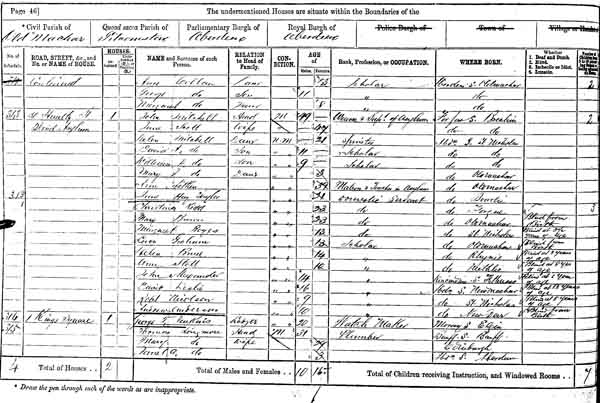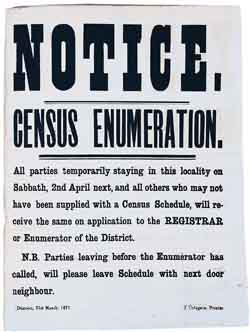1871 Census
1871 Census
The 1871 Census was taken on Sunday 2 April under the provisions of the Act for taking the Census in Scotland (33 & 34 Vict, c.108). Customs officials dealt with returns from vessels in harbours and docks or trading along the coast. Instructions were supplied to the Lords of the Admiralty for the enumeration of persons on board Royal Navy vessels in Scottish waters.
The population of Scotland on 2 April 1871 was 3,360,018.
This guide covers:
1871 Census Questions
There were no new questions but the following changes were made to those asked in 1861:
- “unemployed” could be added to the occupation field if people in a particular trade or profession were out of work on Monday 3 April
- the question on the number of children attending school or being educated at home was amended to between five and 13 years on the advice of the Scottish Education Commissioners as few children stayed in school after the age of 12
- new categories of disability were added, namely, deaf and dumb, blind, imbecile or idiot and lunatic.
This example from the 1871 Census for Old Machar, Aberdeenshire (our reference 1871/168-2/14, page 46) includes the Blind Asylum. The head of the institution has provided additional information about whether the person was blind from birth or from a particular age.
1871 Census Enumerators’ Instructions
You can find further information about how the census was taken in this typed transcription of Instructions to the enumerator as to his duties in taking the census (pdf).
It shows how the census covered travellers, visitors in hotels, large establishments and vessels on canals and navigable rivers.
If someone had stayed overnight but left without providing their name and other details to the person completing the household schedule the enumerator had to record not known (N K).
From this census onwards returns from the Royal Navy have been given registration district reference 902S and those for the Merchant Navy reference 903S.
1871 Census Street Indexes
Census street indexes provide registration district (RD) and enumeration district (ED) references for each street in a city or urban area. They also cover institutions such as asylums, hospitals, workhouses, prisons, police stations and barracks as well as hotels and public buildings.
There are 35 street indexes for the 1871 census. They have been digitised and are made available as pdf files that are several megabytes in size.
If you can’t find a particular street it may not have existed in 1871 or may have had a different name.
- Aberdeen
- Arbroath
- Ayr
- Bothwell and Holytown
- Brechin
- Cadder (Western District) and Cadder (Eastern District)
- Calderhead
- Cambusnethan
- Campbeltown
- Dalry
- Dumfries
- Dundee
- Dunfermline
- Edinburgh and Leith
- Falkirk
- Forfar
- Glasgow
- Greenock
- Hamilton
- Hawick
- Inverness
- Kilmarnock
- Kirkcaldy
- Lesmahagow
- Montrose
- New Monkland
- Old Monkland
- Paisley
- Perth
- Peterhead
- Rothesay
- Rutherglen
- Shotts
- Stirling
- Stornoway

